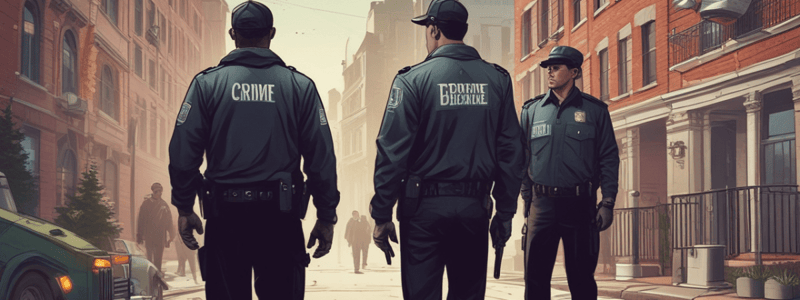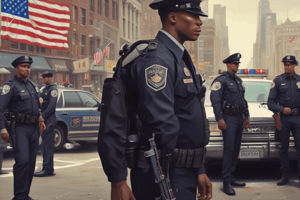Podcast
Questions and Answers
What is the main objective of community crime prevention?
What is the main objective of community crime prevention?
- To encourage community involvement in law enforcement
- To increase patrols in high-crime areas
- To maintain a reactive response to crime
- To reduce opportunities for criminal activities (correct)
What is the primary goal of preventive patrol?
What is the primary goal of preventive patrol?
- To interact with schools and students
- To reduce the opportunity for criminal activity (correct)
- To respond to calls for service
- To increase the visibility of law enforcement
What is an example of the Opportunity Reduction Model?
What is an example of the Opportunity Reduction Model?
- Increasing patrols in high-crime areas
- Removing buildings conducive to drug activity (correct)
- Implementing community policing
- Adding rewards for good behavior
What is the primary focus of the Informal Social Control Model?
What is the primary focus of the Informal Social Control Model?
What is Risk Avoidance an example of?
What is Risk Avoidance an example of?
What is a characteristic of Community Policing?
What is a characteristic of Community Policing?
What is the main goal of D.A.R.E.?
What is the main goal of D.A.R.E.?
What is an example of a collective approach to crime prevention?
What is an example of a collective approach to crime prevention?
What is the main role of a D.A.R.E. officer?
What is the main role of a D.A.R.E. officer?
What is a key component of problem-solving in law enforcement?
What is a key component of problem-solving in law enforcement?
What does crime prevention require?
What does crime prevention require?
What is emphasized in aggressive patrol performance?
What is emphasized in aggressive patrol performance?
What is one of the components of crime prevention through environmental design?
What is one of the components of crime prevention through environmental design?
What is the focus of community policing?
What is the focus of community policing?
What is the goal of the D.A.R.E. program?
What is the goal of the D.A.R.E. program?
What is the purpose of preventive patrol?
What is the purpose of preventive patrol?
What is one of the initiatives of media and public education strategies?
What is one of the initiatives of media and public education strategies?
What is a key factor in maximizing the effectiveness of preventive patrol?
What is a key factor in maximizing the effectiveness of preventive patrol?
What is the purpose of building checks during business hours?
What is the purpose of building checks during business hours?
What is the focus of crime prevention through environmental design?
What is the focus of crime prevention through environmental design?
What is one of the steps in the process of doing community crime prevention?
What is one of the steps in the process of doing community crime prevention?
What is the result of law enforcement recognizing the necessity of community ties?
What is the result of law enforcement recognizing the necessity of community ties?
What is the purpose of networking with community groups in preventive patrol enforcement?
What is the purpose of networking with community groups in preventive patrol enforcement?
What is the outcome of community policing initiatives?
What is the outcome of community policing initiatives?
What is one of the ways to harden a home and prevent crime?
What is one of the ways to harden a home and prevent crime?
What is the benefit of street lighting in crime prevention?
What is the benefit of street lighting in crime prevention?
What is one of the school-based prevention initiatives?
What is one of the school-based prevention initiatives?
What is the purpose of cameras and alarms in crime prevention?
What is the purpose of cameras and alarms in crime prevention?
What is the primary reason law enforcement is frequently featured in the media?
What is the primary reason law enforcement is frequently featured in the media?
What can law enforcement agencies learn from others in their field?
What can law enforcement agencies learn from others in their field?
What was the role of the media in the McGruff and Daren the Lion programs?
What was the role of the media in the McGruff and Daren the Lion programs?
Why is it important to network with other law enforcement agencies?
Why is it important to network with other law enforcement agencies?
What is a potential benefit of learning from others' experiences in law enforcement?
What is a potential benefit of learning from others' experiences in law enforcement?
What is the primary goal of identifying and cultivating a private citizen who knows what is happening on their block?
What is the primary goal of identifying and cultivating a private citizen who knows what is happening on their block?
What is one of the conditions that create crime, according to Basic Patrol Procedures by Tim Perry?
What is one of the conditions that create crime, according to Basic Patrol Procedures by Tim Perry?
What is the purpose of checking high-risk places frequently?
What is the purpose of checking high-risk places frequently?
What is one way to be a role model for newer officers?
What is one way to be a role model for newer officers?
Why is it important for law enforcement to be proactive in checking vacant homes and properties?
Why is it important for law enforcement to be proactive in checking vacant homes and properties?
What is one potential use of vacant homes and buildings by criminals?
What is one potential use of vacant homes and buildings by criminals?
What should be done during the first check of a vacant home or building?
What should be done during the first check of a vacant home or building?
Why is it important to work with the property owner or city/county building departments to have vacant buildings secured?
Why is it important to work with the property owner or city/county building departments to have vacant buildings secured?
What is the purpose of the D.A.R.E. program?
What is the purpose of the D.A.R.E. program?
What is the primary goal of the D.A.R.E. program?
What is the primary goal of the D.A.R.E. program?
How do D.A.R.E. officers interact with students outside of the classroom?
How do D.A.R.E. officers interact with students outside of the classroom?
What is the SARA model used for in community problem solving?
What is the SARA model used for in community problem solving?
What is an example of a community group that D.A.R.E. officers work with?
What is an example of a community group that D.A.R.E. officers work with?
What is the purpose of analyzing calls for service data?
What is the purpose of analyzing calls for service data?
What is the benefit of conducting interviews with residents in community problem solving?
What is the benefit of conducting interviews with residents in community problem solving?
What is the role of crime statistics in community problem solving?
What is the role of crime statistics in community problem solving?
What is the purpose of D.A.R.E. officers working with community groups?
What is the purpose of D.A.R.E. officers working with community groups?
What is the benefit of community involvement in the D.A.R.E. program?
What is the benefit of community involvement in the D.A.R.E. program?
What is the goal of community problem solving in law enforcement?
What is the goal of community problem solving in law enforcement?
Flashcards are hidden until you start studying
Study Notes
Crime Prevention
- Crime prevention is a cooperative effort between law enforcement and the community to discourage criminal activity.
- Crime rates are heavily influenced by social forces in the community.
Strategic Models for Crime Prevention
- Two basic strategic models:
- Opportunity Reduction Model: focuses on removing or reducing opportunities for criminal activity.
- Informal Social Control Model: uses rewards and punishments by community members to encourage conformity with local customs and norms.
Individual Self-Protection Strategies
- Three cooperative strategies:
- Risk Avoidance: proactive stance to remove criminal targeting methods.
- Resistance and Self-Defense Activities: carrying objects of protection, being physically fit, and capable of yelling or running.
- Victim Services: immediate access to counseling and medical care.
Collective Approaches to Crime Prevention
- Six approaches:
- Watch programs
- Citizen patrols
- Neighborhood organizations
- Board counsels and commission
- Social problems approach
- Community policing
Community Policing
- Four components:
- Foot patrol
- Neighborhood mini stations/community centers
- Police organizing and outreach strategies
- Analysis and mapping of crime-related dates
Crime Prevention through Environmental Design
- Four components:
- Household Target Hardening: making homes less penetrable.
- Street Lighting: using higher lumens to discourage criminal activity.
- Street Lighting and Traffic Patterns: identifying accessible areas.
- Cameras and Alarms: using cameras for identification and alarms for shock and scare tactics.
Media and Public Education Strategies
- Two initiatives:
- McGruff National Media Campaign: using large motor homes to educate on crime prevention.
- Crime Stoppers: identifying methods to harden homes and prevent crime.
School-Based Prevention Initiatives
- Three initiatives:
- Law-related education
- Crime prevention and safety programs
- Drug and alcohol abuse prevention
Process of Doing Community Crime Prevention
- Four steps:
- Define the problem
- Develop the program
- Implement and maintain the program
- Evaluate and give feedback
Preventive Patrol
- Purpose: to prevent crime by reducing opportunities to commit crime.
- Eight approaches to maximize effectiveness:
- Traffic stops
- Building checks
- Pedestrian checks
- Resistance checks
- Vehicle license checks
- Networking with community groups
- Reducing opportunities for crime
- Seeking out and correcting conditions that breed crime
Role Models
- Learn from the success of others
- Choose role models who generate respect from commanders, peers, and the public
Checking Security of Vacant Homes and Property
- Steps to check a vacant home/building:
- First check during daytime
- Alternate times of day for subsequent checks
- Work with property owners or city/county building departments to secure properties
- Observe doors and windows for signs of tampering
- Perform checks with a partner whenever possible
DARE Program
- Purpose: to reduce abuse of drugs, demand for drugs, and overall criminality while fostering a positive image of law enforcement.
- Community involvement:
- Officers work with various community groups to address community problems
- Program is found in local law enforcement, school boards, Chambers of Commerce, and business/professional organizations
Community Problem Solving
- SARA model:
- Scanning: identify the problem
- Analysis: understand the nature, scope, courses, victims, and social/physical components
- Response: develop a course of action
- Analysis: evaluate the effectiveness of the response
Patrol Methods
- Six methods:
- Foot patrol
- Bicycle patrol
- Community meetings
- Community councils
- Satellite police stations
- Community newsletters
Innovative Patrol Strategies
- Sources for information:
- Calls for service data
- Crime statistics
- Interviews with residents
- Media
- Other peace officers
Studying That Suits You
Use AI to generate personalized quizzes and flashcards to suit your learning preferences.




